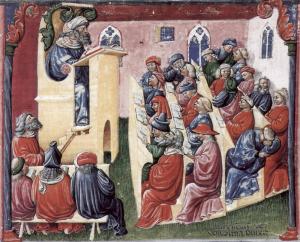 When theologizing and philosophizing, we like to use reason to produce unconditional results. We gravitate to arguments based upon necessity. Metaphysically, anything which cannot be shown to be necessary seems questionable, and indeed, unlikely to be true. This desire for arguments which lead to necessary conclusions, alas, demonstrates egotism and pride, expecting too much out of ourselves and the ability of human reason. We think we can know it all. What we don’t know yet, we have the potential to know, and all it will take is careful use of our reason to produce necessary truths which we can then believe.
When theologizing and philosophizing, we like to use reason to produce unconditional results. We gravitate to arguments based upon necessity. Metaphysically, anything which cannot be shown to be necessary seems questionable, and indeed, unlikely to be true. This desire for arguments which lead to necessary conclusions, alas, demonstrates egotism and pride, expecting too much out of ourselves and the ability of human reason. We think we can know it all. What we don’t know yet, we have the potential to know, and all it will take is careful use of our reason to produce necessary truths which we can then believe.
This, however, is unreasonable. Human reason is a good tool, but it is a tool with limits. We can and should embrace it while recognizing it is both fallible (as any human tool is) and requires the use of various given truths before it can engage them and deduce something new from them. Unless we are dealing with truths derived from reason itself, we will be dealing with truths given to us, which we accept to be true in a way which precedes our reasoning ability.
This is why medieval theologians, understanding and embracing reason, did not limit their theological analysis to pure analytical philosophy. They knew and appreciated their limitations. They knew that as much as we could try to do so, we could never use our reason to establish a comprehensive, accurate understanding of the cosmos. It is too large for us to comprehend. Such attempts to reason out the universe, to systematize it using the human intellect, is bound to failure. The human intellect is so limited, it has difficulty addressing and understanding what is most common to it, the person using it; how, then, could it be expected to address the transcendence of creation, let alone the further infinite transcendence of God?
Necessary arguments certainly have a place in delineating the universe. There are some qualities of creation which we can comprehend, and through our comprehension reason out further insights which necessarily follow. If someone is walking, they are necessarily moving. If someone is alive, they are breathing. What we must do, however is put aside any attempt to comprehend that which is greater than us by our reason. We might like to dictate how such subjects should act, but in doing so, we demonstrate our desire to take undue control, forcing those subjects to lose their freedom and to follow the limited dictates of our minds and what we can reason from them.
Yet, if we cannot establish necessary arguments, presenting a metaphysics which necessarily applies to the universe and demonstrates its constituents, are we therefore free to reject reason, to ignore its suggestions? Medieval scholars routinely answered this question negatively. While we cannot make arguments from necessity, we should still discern some sort of rationale for what is, and for what subjects, even transcendent subjects, do. This rationale must not be read as being necessitated because of what we suggest, but rather, it should serve as an explanation by which we can understand what we observe or come to know.
Free subjects, especially free transcendent subjects, cannot be reduced to logical necessity, but there are reasons for what they do, even if those reasons are in themselves not necessary. We can see this in our own lives. When we choose something to eat, we have many options before us. We are not forced to decide one choice over another, but on the other hand, there are reasons for why we make our choice. Reason can help explain the choices we make to others. Reason might even suggest that for a given subject, some choices are more probable than others to be chosen by a particular subject, but in doing so, it still cannot determine what the choice will be. It can reflect in hindsight, sometimes making it appear the choice was fated, but it cannot absolutely predict with foresight what will be chosen.
What medieval authors often liked to discuss, using reason, was not what was necessary, but what was fitting. Certainly what is actually necessary will also be able to be examined along the lines of fittingness, but not all things which are fitting are necessary. Fittingness looks for reasons, for possible causes or explanations, for congruences which make sense, in relation to all kinds of metaphysical subjects. It looks for something which is suitable with what we know and understand while allowing that there is much which we do not know or could ever understand.
Fittingness as a concept especially works well to explain the way God works with creation. God, who is infinitely transcendent to us, is the ultimate mystery. We cannot explain God. We cannot comprehend his ways. We cannot place our expectations on him. We can listen, learn, find God reveals something to us, which we then not only accept, but then try to understand. As we do so, we might be tempted to return to the concept of necessity: if God did it, it must be necessary, so we will look for a necessary explanation for what he does. But this then turns God from the ultimate subject to the ultimate object, with no freedom. God’s freedom is great, so much greater than ours, that the problem we have for explaining the motives of human actions become infinitely greater when trying to explain God and how he acts. And yet, we try, and the way we try is to explain how his actions fit what we know about God based upon what he has revealed of himself to us. Theological arguments, explanations for the great mysteries of the faith, such as why God incarnated himself, why he did so at a particular time and place and not at other times or places, why he chose Mary to be his mother instead of coming into the world without a mother, all of these arguments are often reflected under the category of fittingness, so that we do not end up making presumptions about God. Reason, therefore, remains important, but it serves as a part of our reflection of what is given over to us more than it is to reflect upon and try to establish something which has not yet already been revealed. It works to help us understand the faith and see it does not contradict reason, but it also recognizes, as logicians already recognize, that reason is limited and is capable of producing good results insofar as we have enough data to produce them. When dealing with transcendent subjects, the data we have will be only of the kind which allows for reflection, the same which we see is at play in the study of history, because it will never be sufficient for us to go beyond such reflection.
Fittingness, also, serves as an aesthetic approach to the truth. Arguments which deal with the fittingness of what is revealed work not only with reason, but seeks to harmonize what has been revealed with what our reason can lead us to understand. This harmonization seeks and establishes the truth in the beauty of the arguments which we propose. If it is fit, it is beautiful, making the argument attractive. This is why so many people end up believing something to be true, not because they have discerned something necessary with the argument, but because it fits with their aesthetic understanding; they are much readier to believe what entices them than they are with something which does not. Of course, this also shows us one of the limitations of arguments from fittingness: not everyone has the same aesthetic approach and understanding, and what could work for one, and seem harmonious and true, will not seem such to another. This is why there is often the need for many parallel, or complementary, explanations when dealing with a revealed truth.
If we cannot determine a theological truth as being necessary, this should not detour us. It does not mean there is no rationale behind the truth. Rather, it means that the truth like so many truths, cannot be comprehended by the limited human intellect and its attempt to control and dictate to the universe what it must be like. Reason is a gift which must not be denied, but it is a tool which is limited, even as the mind which uses it is limited. Theology, especially the best theology, engages God and the teachings of the faith as a mystery which cannot be comprehended by us and yet which can still be engaged by reason. Faith and reason do not have to contradict each other: faith accepts the givenness of the transcendent mystery, reason seeks to understand it, recognizing, however, what such understanding entails and does not entail. We must humble ourselves when dealing with the transcendent mystery of the absolute truth. We can give fit explanations for it, within the contours of relative conventional truth, but any attempt to go beyond that, and we ourselves have become unreasonable and unfit for our theological investigations.
[IMG= Liber ethicorum des Henricus de Alemannia by Laurentius de Voltolina [Public domain], via Wikimedia Commons]
Stay in touch! Like A Little Bit of Nothing on Facebook













